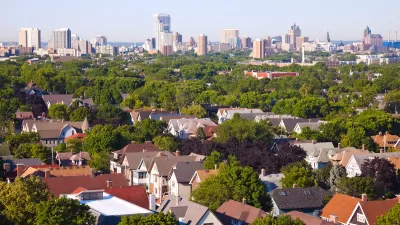Proposed changes would create more room for mid-density housing and shift away from single-family homes on large lots.

In an article for Towers, James Rambin outlines proposed zoning changes in Austin that would reduce minimum lot sizes and alter the single-family zoning that has dominated most of the city’s residential areas to allow for more ‘missing middle housing’ types.
As Rambin explains, “Austin’s 1980s land development code imposes a minimum lot size of 5,750 square feet for homes built under the single-family zoning regime that dominates the vast majority of the city’s available land.”
Now, a resolution before the city council “proposes amending the code to reduce the minimum lot size in single-family zones to 2,500 square feet or less ‘so that existing standard-size lots can be subdivided, and be developed with a variety of housing types such as row houses, townhomes, tri-and four-plexes, garden homes, and cottage courts.’”
The resolution also asks the City Manager to develop proposed amendments to other zoning rules such as “setbacks, height, impervious cover, floor-to-area ratio, building cover requirements, and other tweaks like only imposing the city’s McMansion Ordinance on projects that intend to construct a single home on one lot.”
While Rambin believes these changes should have been implemented decades ago to prevent the current housing crisis, “these code tweaks are a major step in the right direction.”
FULL STORY: Austin Finally Faces Down the Housing Crisis With Single-Family Zoning Reform

Alabama: Trump Terminates Settlements for Black Communities Harmed By Raw Sewage
Trump deemed the landmark civil rights agreement “illegal DEI and environmental justice policy.”

Study: Maui’s Plan to Convert Vacation Rentals to Long-Term Housing Could Cause Nearly $1 Billion Economic Loss
The plan would reduce visitor accommodation by 25% resulting in 1,900 jobs lost.

Planetizen Federal Action Tracker
A weekly monitor of how Trump’s orders and actions are impacting planners and planning in America.

Waymo Gets Permission to Map SF’s Market Street
If allowed to operate on the traffic-restricted street, Waymo’s autonomous taxis would have a leg up over ride-hailing competitors — and counter the city’s efforts to grow bike and pedestrian on the thoroughfare.

Parklet Symposium Highlights the Success of Shared Spaces
Parklets got a boost during the Covid-19 pandemic, when the concept was translated to outdoor dining programs that offered restaurants a lifeline during the shutdown.

Federal Homelessness Agency Places Entire Staff on Leave
The U.S. Interagency Council on Homelessness is the only federal agency dedicated to preventing and ending homelessness.
Urban Design for Planners 1: Software Tools
This six-course series explores essential urban design concepts using open source software and equips planners with the tools they need to participate fully in the urban design process.
Planning for Universal Design
Learn the tools for implementing Universal Design in planning regulations.
Caltrans
Smith Gee Studio
Institute for Housing and Urban Development Studies (IHS)
City of Grandview
Harvard GSD Executive Education
Toledo-Lucas County Plan Commissions
Salt Lake City
NYU Wagner Graduate School of Public Service





























